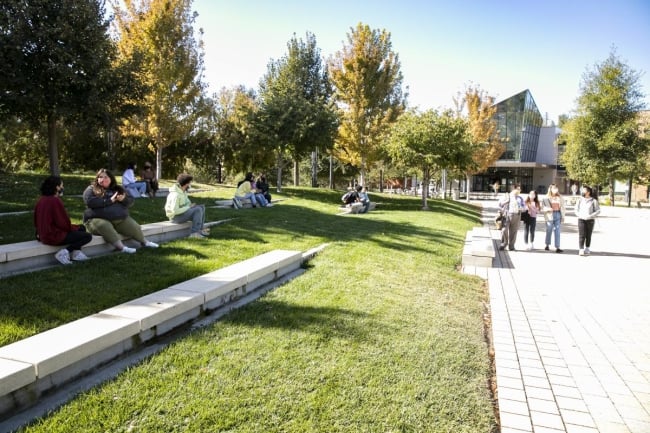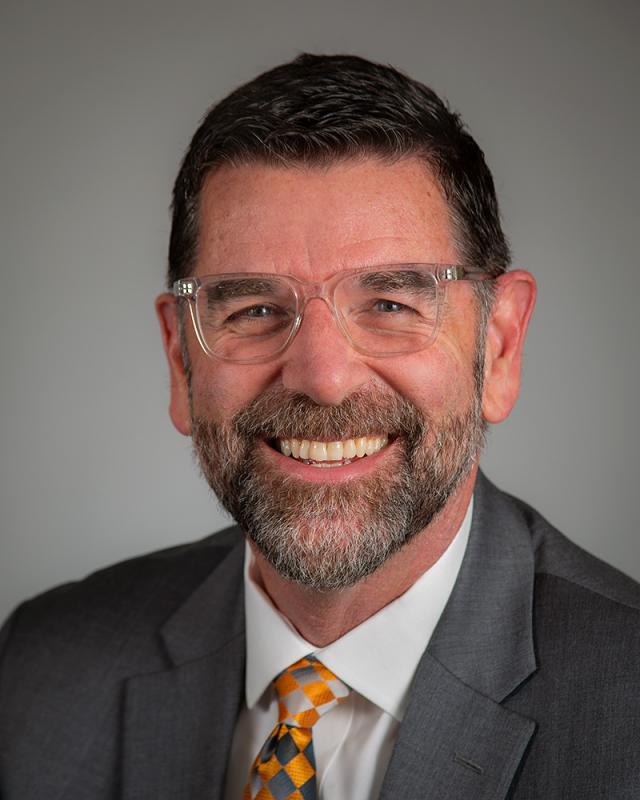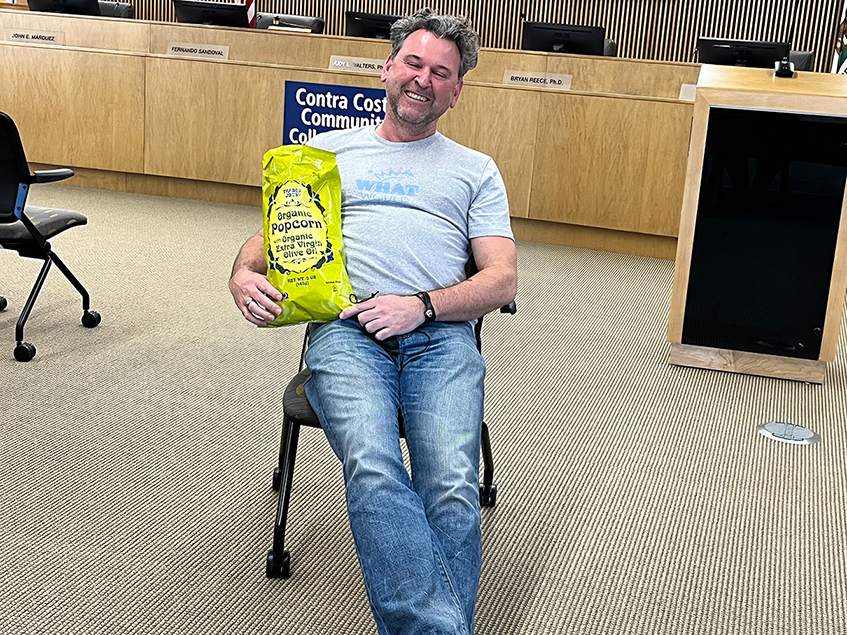You have /5 articles left.
Sign up for a free account or log in.

Contra Costa Community College District
The Contra Costa Community College District Governing Board unanimously voted to put Chancellor Bryan Reece on paid administrative leave earlier this month, marking his second leave in less than a year and another chapter in an ongoing saga of investigations, lawsuits and infighting among various factions in the Northern California district.
The board, which has five voting members, previously put Reece on paid administrative leave on Sept. 14, only to reinstate him about two weeks later after a heated special governing board meeting during which faculty members in the district and community members came to Reece’s defense. The most recent vote occurred Feb. 2. Both the initial vote to put him on leave and the one to reinstate him were split.
Board members have not disclosed why Reece was put on leave in either instance or why he was briefly reinstated. Mojdeh Mehdizadeh, executive vice chancellor of education and technology, has been appointed acting chancellor for a second time.
Reece was hired in November 2020 after he previously served as president of Norco College in Riverside, Calif. He was fired from that position, also without a public explanation, despite protests from faculty and staff members.
Reece described the current state of affairs as “a very complicated personnel matter” that the board was “working through.” He said in an email that he’s hopeful board members will “make a decision to benefit students and encourage the other individuals involved in this matter to lead with student interests in mind.”
 He said the district was embroiled in interpersonal conflicts before he arrived, and he noted it has had five different permanent, acting and interim chancellors in the last seven years. He also pointed out that there were multiple votes of no confidence in the board by faculty and staff groups at the colleges in 2020, and that the district received an official notice from the district’s accreditor warning of the possible loss of accreditation if the board did not improve its conduct.
He said the district was embroiled in interpersonal conflicts before he arrived, and he noted it has had five different permanent, acting and interim chancellors in the last seven years. He also pointed out that there were multiple votes of no confidence in the board by faculty and staff groups at the colleges in 2020, and that the district received an official notice from the district’s accreditor warning of the possible loss of accreditation if the board did not improve its conduct.
“Over the last 10 years, many senior administrators have left, resigned, lost contracts, retired early, are on leave or are looking to leave,” Reece said. “When I originally applied for the position in 2020, the internal fighting was so perceptible and problematic that every candidate—except for me—dropped out of the search. As an optimist, I agreed to step into the fray, but the contentious nature of internal relationships continued right on through the pandemic and is as present today as it has ever been. My hope for the leadership in this district is that they are able to recognize these patterns and deal with them in constructive ways. If they continue with current patterns, students will suffer.”
He also noted that 90 percent of the district’s students, who could be affected by the upheaval, are “students of color, students from families with low/moderate income, students from families with recent immigrant histories, or students with no college graduates in their family.”
“Working with these students is a blessing; it is the work I have dedicated my life to,” he added.
Members of the district’s governing board were more circumspect about explaining what prompted the decision to place Reece on leave.
“This is a personnel matter and there is nothing to report at this time,” Judy Walters, the board’s president, said in an email.
An ‘Unusual’ Move
Timothy Leong, the district’s director of communications and community relations, said ongoing investigations into “legal matters” were underway when Reece was briefly reinstated, and “there was a number of things the governing board was waiting for in terms of additional information.”
“The conversations with legal counsel led to the governing board now making this more recent decision, for a second time, to put him on paid administrative leave,” he said. “This is clearly a complex problem that we’re faced with. It is not lost on anybody that to put a chancellor on paid administrative is a huge step.”
John Freytag, president of the Academic Senate at Diablo Valley College, one of the district’s colleges, said he trusts the board made an informed decision.
“I know that our governing board members or trustees have a lot of information that’s available to them,” he said. “I was struck by the fact that it was a unanimous vote … I think that speaks to the seriousness of the situation, and we just at this point have to trust that the governing board has the best interest of the district and our colleges and our students in mind.”
Jill Derby, a senior consultant at the Association of Governing Boards of Universities and Colleges, said putting a chancellor on leave twice is “highly unusual” and clearly signals a “rocky relationship” between the chancellor and the board. She added that even if a chancellor’s performance is under review, the person is usually kept in the role during the process.
Board members are likely “looking more deeply into whatever friction has occurred, whatever the incidents are that have left questions in the minds of the board. It probably would indicate that they’re looking hard at something or somethings that transpired over the preceding month.”
Leong noted that there were benefits to bringing Reece back at least briefly, even though he was under investigation, because district leadership is severely understaffed. The board chose not to renew the contracts of three senior administrators in 2020, to the bafflement of faculty and staff union leaders. (Two of the board members who voted for the nonrenewals were separately found to have committed ethics violations and were replaced in a November 2020 election.)
The former chief financial officer, Jonah Nicholas, left the district for another job, while the two other administrators—Eugene Huff, executive vice chancellor of administrative services, and Dio Shipp, associate vice chancellor and chief human resources officer—chose to stay at the district until the end of their contracts. However, both have since been put on paid administrative leave without explanation.
With Reece on leave, only three administrators, plus an interim administrator, were left to run the district office.
Ongoing Conflict
Complicating matters further, the administrators whose contracts were not renewed have recently sued the district to demand access to public records. The lawsuit, filed in October, alleges all three administrators submitted complaints to the district claiming they experienced retaliation—and, in Shipp’s case, racial discrimination—and the district failed to produce documents they requested. The documents were related to investigations of those complaints, an investigation of a faculty member that Reece allegedly quashed and formal complaints filed against Reece.
The court sided with the complainants, and the district was required to give the documents to the judge overseeing the case on Friday. The documents are expected be released to the public Feb. 18. The three administrators also officially sued the district in November for retaliation, among other charges.
Neal Skapura, president of the district’s classified staff union, the district chapter of AFSCME Local 1, believes the soon-to-be-released documents will shed light on why Reece was placed on leave and unearth examples of misconduct. Skapura, meanwhile, has been put on temporary suspension since Feb. 8 by the union for “actions inimical to the union,” according to a suspension letter from Winston Ingram, president of AFSCME Public Employees Union Local 1.
In the absence of an explanation from the board, various theories about why Reece was put on leave circulated among district employees who offered contradictory pictures of Reece’s short time as chancellor thus far.
Skapura believes Reece has committed several ethical violations, including allegedly interfering in the investigation of an instructor and allowing a marketing firm to bid on a contract to carry out a marketing plan the firm helped devise. Some employees have dismissed these incidents as judgement calls by an inexperienced but well-intentioned chancellor. Skapura is not among those giving the chancellor the benefit of doubt: he sees these behaviors as a pattern of misconduct.
Skapura claims Reece retaliated against him in June 2021 for questioning the experience level of an acting associate vice chancellor of human resources appointed by Reece. Skapura said he received notice from human resources of an investigation into a complaint against him by a union member shortly after Skapura made his concerns known. The complaint accused Skapura of harassment, discrimination and bullying. An investigation of the retaliation claim did not find that Reece acted against Skapura and also concluded the complaint against Skapura fell under the purview of the union, not the district.
Reece is “pathological in the sense that he just blunders ahead, doesn’t listen to people whether it’s counsel or his colleagues, and just continues to do whatever he wants to do,” Skapura said.
 Skapura said Reece also gave the board a falsely rosy picture of how bond-rating agencies rated the district in a Jan. 12 board meeting. Skapura also suspects Reece failed to disclose information about the investigation into Reece and lawsuits against the district in a recent meeting with bond-rating agencies. The meeting was focused on selling off district bonds. This allegation, and others, are detailed in a series of emails sent to district leaders by a “Travis Johnson,” from an unfamiliar account unaffiliated with the district. It is unclear whether Johnson is a real person or a pseudonym or if this person is employed by the district. Skapura said he believes the emails and has a T-shirt that says “What would Travis do?” which he wore to the board meeting where Reece was put on leave a second time. He also brought popcorn to the meeting.
Skapura said Reece also gave the board a falsely rosy picture of how bond-rating agencies rated the district in a Jan. 12 board meeting. Skapura also suspects Reece failed to disclose information about the investigation into Reece and lawsuits against the district in a recent meeting with bond-rating agencies. The meeting was focused on selling off district bonds. This allegation, and others, are detailed in a series of emails sent to district leaders by a “Travis Johnson,” from an unfamiliar account unaffiliated with the district. It is unclear whether Johnson is a real person or a pseudonym or if this person is employed by the district. Skapura said he believes the emails and has a T-shirt that says “What would Travis do?” which he wore to the board meeting where Reece was put on leave a second time. He also brought popcorn to the meeting.
Leong, the district spokesman, described the accusation as “hearsay.”
Reece said in an email that Skapura’s allegations are “a good example of the toxicity some individuals create inside Contra Costa Community College District.”
“The vast majority of employees in the district are pleasant, professional, hardworking individuals, who are absolutely committed to serving our students,” he said. “These individuals engage, communicate and collaborate in a constructive manner. But there are a few recognized leaders in the district who have continued to make public statements that are at times personalized, sensational, inaccurate, defamatory and damaging to relationships if not careers. This tone has been part of the culture for too long and has contributed to the exit of leadership [the district] has experienced for over a decade.”
Jeffrey Michels, executive director of the district’s faculty union, said he didn’t “know the facts” about why Reece was put on leave. But “I have never had any interactions with Chancellor Reece where I found him to be dishonest, and I liked working with him,” he said. “I feel that his vision of education is a good one and that he cares about the students and about the institution.”
Michels described Reece as first-time chancellor who needed more support coming into a three-college district known for infighting.
He believes constant leadership turnover and a lack of transparency by the board has been destabilizing for the district in a way that risks hurting students.
“I don’t think your average student knows or cares who the chancellor is,” he said. “But eventually it affects everyone when we’re focused on internal politics rather than educational programs.”
Derby, of the Association of Governing Boards of Universities and Colleges, said conflict between a chancellor and board can lead to poor management and often makes faculty and staff members feel uneasy.
“These transitions are always very difficult on an institution,” she said. “It takes the attention away from the issues facing the district and the colleges.”
Derby said the disruption in leadership is not just unsettling, it also leaves everyone unsure about the direction of the district. She also noted that college districts with a history of conflict have a harder time attracting candidates if board members do ultimately decide to hire a new chancellor.
Michels said he hopes a sense of stability returns to the district before the ongoing turmoil starts to affect teaching and learning.
“Teachers should not be distracted by educational politics,” he said. “Anytime district politics boils up to such a point where professors are stopping me in the hallway to ask what the heck is going on, then we know we’re not doing as good a job as we need to be doing as leaders in the district.”





